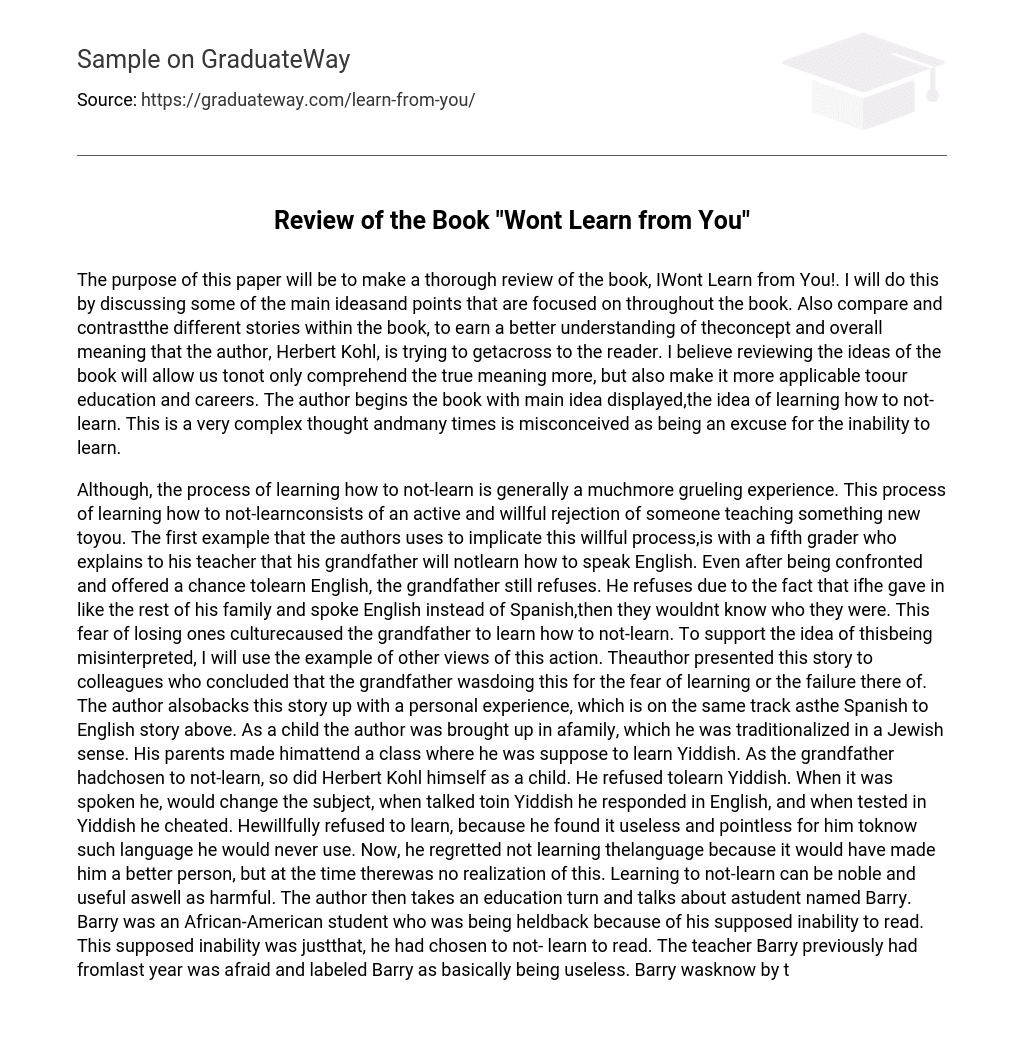The purpose of this paper will be to make a thorough review of the book, IWont Learn from You!. I will do this by discussing some of the main ideasand points that are focused on throughout the book. Also compare and contrastthe different stories within the book, to earn a better understanding of theconcept and overall meaning that the author, Herbert Kohl, is trying to getacross to the reader. I believe reviewing the ideas of the book will allow us tonot only comprehend the true meaning more, but also make it more applicable toour education and careers. The author begins the book with main idea displayed,the idea of learning how to not-learn. This is a very complex thought andmany times is misconceived as being an excuse for the inability to learn.
Although, the process of learning how to not-learn is generally a muchmore grueling experience. This process of learning how to not-learnconsists of an active and willful rejection of someone teaching something new toyou. The first example that the authors uses to implicate this willful process,is with a fifth grader who explains to his teacher that his grandfather will notlearn how to speak English. Even after being confronted and offered a chance tolearn English, the grandfather still refuses. He refuses due to the fact that ifhe gave in like the rest of his family and spoke English instead of Spanish,then they wouldnt know who they were.
This fear of losing ones culturecaused the grandfather to learn how to not-learn. To support the idea of thisbeing misinterpreted, I will use the example of other views of this action. Theauthor presented this story to colleagues who concluded that the grandfather wasdoing this for the fear of learning or the failure there of. The author alsobacks this story up with a personal experience, which is on the same track asthe Spanish to English story above. As a child the author was brought up in afamily, which he was traditionalized in a Jewish sense. His parents made himattend a class where he was suppose to learn Yiddish. As the grandfather hadchosen to not-learn, so did Herbert Kohl himself as a child. He refused tolearn Yiddish. When it was spoken he, would change the subject, when talked toin Yiddish he responded in English, and when tested in Yiddish he cheated.
Hewillfully refused to learn, because he found it useless and pointless for him toknow such language he would never use. Now, he regretted not learning thelanguage because it would have made him a better person, but at the time therewas no realization of this. Learning to not-learn can be noble and useful aswell as harmful. The author then takes an education turn and talks about astudent named Barry. Barry was an African-American student who was being heldback because of his supposed inability to read. This supposed inability was justthat, he had chosen to not- learn to read. The teacher Barry previously had fromlast year was afraid and labeled Barry as basically being useless. Barry wasknow by the other students as being the child that the teachers were afraid of.
Herbert Kohl confronted Barry with a book and asked him to read it, which inturn, Barry through a temper tantrum and threw the book on the floor. Afterassessing the situation, Herbert Kohl went to Barry and quickly read the firstsentence to Barry and asked him to read it back. This allowed Barry to not givein to the teachers demands but just repeat the sentence that was just statedby the teacher. Barry did so and slowly throughout the next few weeks hisreading gained strength and durability.
Another example used in the book is astudent by the name of Akmir. Akmir was an African-American student whostruggled to maintain his culture and his roots despite the racist schoolsystems he was brought up in. He attacked the curriculum in class and made it atime to fight back against the white racism taught in the classroom. This way,of not learning allowed Akmir to live the life he wanted and not toconform to an already racist system. This is just another example of a childwillfully refusing and learning not to learn. Although there were more storieswithin the text, I believe that the ones touched upon in this review are themost influential and significant.
I believe that the book, I Wont Learnfrom You not only is a must for all teachers and educators, but wake up callto our society. Anyone going into the educational field is obviously going tocome across kids who are learning to not learn. This is book allows you tounderstand the reasons why and the solutions to the problem. It can be used as abuilding block for future reference within any classroom.
Regardless whether itis elementary, high school, or even college. The process of learning not tolearn can be picked up early in a classroom and the teacher will be better ableto access the child needs and exploit his refusal. This will not only make abetter teacher and classroom, but a better student. We need to move away fromthe racist system and derogatory terms we use in our day to day life.
When achild of a minority race, reads this the systems in ruining this child andallowing problems to occur. The learning to not learn aspect of this comes intoplay. Our society as a whole has made gigantic strides in equality in the pastyears, but obviously there is still much work to be done. The only way to negateour problem is for us to stop not learning equality and begin to learn afairness between us that will allow us to work together in the future.





